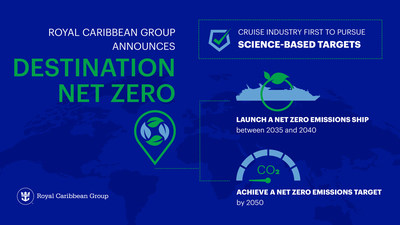Royal Caribbean Group Announces "Destination Net Zero" -- Program to Achieve Net Zero Emissions by 2050
Royal Caribbean Group (NYSE: RCL) announced a major sustainability initiative called Destination Net Zero, aiming for net zero emissions by 2050. This strategy involves establishing Science-Based Targets in collaboration with the Science Based Targets initiative (SBTi). Key milestones include delivering a net zero cruise ship by 2035 and introducing 13 new energy-efficient vessels. The company aims to develop alternative fuels and enhance energy efficiency. Past efforts have involved partnerships with organizations like WWF, and the initiative builds on three decades of sustainability achievements.
- Commitment to achieve net zero emissions by 2050.
- Pioneering industry leadership with the first Science-Based Targets initiative pledge for the cruise sector.
- Plans to deliver a net zero cruise ship by 2035.
- Introduction of 13 new energy-efficient vessels.
- Investment in alternative fuel technologies and energy efficiency.
- Dependence on the development and availability of alternative fuels may pose uncertainties.
- Potential financial implications from implementing extensive sustainability measures.
MIAMI, Oct. 28, 2021 /PRNewswire/ -- Today Royal Caribbean Group (NYSE: RCL) announced a giant step on its sustainability journey: Destination Net Zero, a comprehensive decarbonization strategy that includes pledging to establish Science-Based Targets (SBT) and achieving net zero emissions by 2050.
"Decades ago, we set out on a course to advance sustainability; our vision now is to realize carbon-free cruising over the next two decades," said Richard Fain, chairman and CEO, Royal Caribbean Group. "Today we are announcing the most important destination of all in our company's history – Destination Net Zero – an ambitious strategy to cut emissions, protect our oceans, and ensure the viability of the hundreds of destinations that our guests and crew members care deeply about."
INTRODUCING DESTINATION NET ZERO
Royal Caribbean Group's Destination Net Zero builds on decades of progress and a deep sense of responsibility to embed sustainability throughout the organization.
Over 18 to 24 months, the cruise company will develop goals to be validated by the Science Based Targets initiative (SBTi), the first such pledge for the cruise industry. The work will begin following the publication of SBTi's marine transport methodology. Science-based targets show companies how much, and how quickly, they need to reduce their greenhouse gas (GHG) emissions to help limit global warming.
Along the journey to net zero, key milestones will be critical to making progress. One of the most ambitious milestones includes the delivery of a net zero cruise ship by 2035. To achieve these ambitions, the company will rely on strong partnerships with governments, suppliers and shipyards to develop alternative and accessible fuels and technology.
The company's focus on achieving these measurable goals builds on its track record of designing and operating some of the most energy efficient ships on the seas. Thanks to optimized hull design and system upgrades such as AC chillers utilizing 30
From Silversea Cruises' 'Project Evolution' – the cruise industry's first hybrid-powered ship set to debut summer 2023 – to the wind farm in Kansas that will offset up to
"Royal Caribbean Group has a history of innovating in every aspect and level of the company," said William K. Reilly, chairman, Royal Caribbean Group's board of directors' safety, environment, and health committee. "This is another important step on the serious and ambitious path to preserve the health and allure of the sea and the beauty of the oceans."
Destination Net Zero's four-pronged approach includes:
- Modernization of our global brands fleet through the introduction of 13 new energy-efficient and alternatively fueled vessels, including its recently announced 'Project Evolution' — the industry's first ship to remove all local emissions while at port.
- Continued investment in energy efficiency programs for its fleet, including energy saving technologies, enhanced data systems and digitalization.
- Development of alternative fuel and alternative power solutions.
- Optimized deployment and integration of strategic shore-based supply chains.
THE NEXT CHAPTER OF A 30-YEAR VOYAGE
Royal Caribbean Group's journey to reducing its environmental footprint began nearly 30 years ago with Save the Waves, an ambitious effort that grew from a recycling program into a company-wide approach to embedding challenging, achievable, measurable sustainability targets into the bedrock of the company's culture. Over the ensuing three decades, protecting the planet's finite natural resources evolved organically from a choice to a way of life for the company and its employees.
In 2016, the Group built on this legacy of progress and commitment by embarking on a partnership with World Wildlife Fund (WWF). With the goal of ensuring the long-term health of the oceans and fulfilling a vision of more sustainable cruising, Royal Caribbean Group established ambitious initial 2020 targets to reduce its environmental footprint, support ocean conservation globally and raise awareness among the company's more than 5 million passengers about the importance of ocean conservation. Earlier this year, it announced it had met or exceeded its 2020 goals, with the exception of a sustainable seafood sourcing target (now expected to be met by 2022) that was impacted by the travel suspension from the pandemic.
"Destination Net Zero will help guide our decision-making in the years to come and builds on Royal Caribbean Group's continuous improvement mantra," said Silvia Garrigo, Royal Caribbean Group chief Environmental Social Governance (ESG) Officer. "While we may not have all the answers now, this comprehensive company-wide strategy amplifies our focus on long-term emissions reduction and provides us a roadmap for how to get there."
"Ensuring the long-term health of our oceans requires collective action to effectively address climate change and limit warming to 1.5C," said Carter Roberts, president & CEO of WWF. "Through our partnership, Royal Caribbean Group has been on a journey to improve their overall sustainability. Achieving net zero emissions no later than 2050 will require innovation and collaboration at scale, and WWF looks forward to working together to make progress toward this milestone."
To learn more about Royal Caribbean Group's sustainability efforts, visit https://sustainability.rclcorporate.com/.
About Royal Caribbean Group
Royal Caribbean Group (NYSE: RCL) is one of the leading cruise companies in the world with a global fleet of 60 ships traveling to more than 800 destinations around the world. Royal Caribbean Group is the owner and operator of three award-winning cruise brands: Royal Caribbean International, Celebrity Cruises, and Silversea Cruises, and it is also a
Forward-Looking Statements
Certain statements in this press release constitute forward-looking statements under the Private Securities Litigation Reform Act of 1995. These statements relate to, among other things, the company's expectations, estimates, forecasts and projections regarding environmental, social and governance (ESG) initiatives and the company's ability to achieve its ESG goals. Forward-looking statements reflect management's current expectations and are subject to risks, uncertainties and other factors that could cause our actual results, performance or achievements to differ materially from the future results, performance or achievements expressed or implied in those forward-looking statements. Factors that could affect our results, performance and achievements include, among others, the cost and availability of alternative fuels and emissions-reducing technologies and solutions and the development and applicability of science-based target methodologies, as well as those factors discussed under the caption "Risk Factors" in our most recent annual report on Form 10-K, as well as our other filings with the SEC, copies of which may be obtained by visiting our Investor Relations website at www.rclinvestor.com or the SEC's website at www.sec.gov. Undue reliance should not be placed on the forward-looking statements in this release, which are based on information available to us on the date hereof. We undertake no obligation to publicly update or revise any forward-looking statements, whether as a result of new information, future events or otherwise.
![]() View original content to download multimedia:https://www.prnewswire.com/news-releases/royal-caribbean-group-announces-destination-net-zero--program-to-achieve-net-zero-emissions-by-2050-301411074.html
View original content to download multimedia:https://www.prnewswire.com/news-releases/royal-caribbean-group-announces-destination-net-zero--program-to-achieve-net-zero-emissions-by-2050-301411074.html
SOURCE Royal Caribbean Group
FAQ
What is Royal Caribbean Group's Destination Net Zero initiative?
When is the target date for Royal Caribbean to deliver a net zero cruise ship?
What key milestones does Royal Caribbean Group plan to achieve under Destination Net Zero?
How does Royal Caribbean Group plan to collaborate for its sustainability goals?








